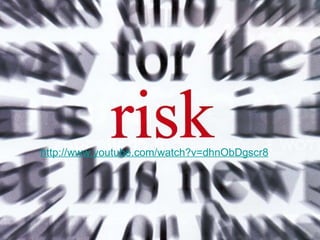Risky World - introduction to hazards
- 1. Year 7 Unit 3: It's a Risky World http://www.youtube.com/watch?v=dhnObDgscr8
- 2. R I S K Y W O R L D U N I T Date = Monday 7 February Learning Objectives ŌĆóTo understand what is meant by ŌĆ£risky placesŌĆØ ŌĆóTo find out how we can measure risk ŌĆóTo analyse risks at different scales
- 3. Organise these jumbled words to create definitions of the word risk. Write them in your book. Start like this Risk means ... situation exposure a dangerous to something happen the that will possibility unpleasant
- 4. Risk means .... Risk means exposure to a dangerous situation Risk means the possibility that something unpleasant will happen 4
- 5. Which risks do we have to face in the UK? ? Earthquakes Tornadoes Rabies Hurricanes Drought Bird Flu Terrorism Shootings Flooding Volcanic eruptions Tsunamis Blizzards Obesity No To an extent No No No Yes Yes Yes Yes Yes To an extent Yes Yes
- 6. Florida v Bangladesh.pdf Certain 10 20 30 40 50 60 70 80 90 100 Almost Certain 9 18 27 36 45 54 63 72 81 90 Very Likely 8 16 24 32 40 48 56 64 72 80 Probable 7 14 21 28 35 42 49 56 63 70 Likely 6 12 18 24 30 36 42 48 54 60 Likely 5 10 15 20 25 30 35 40 45 50 May Happen 4 8 12 16 20 24 28 32 36 40 Impro- bable 3 6 9 12 16 18 21 24 27 30 Unlikely 2 4 6 8 10 12 14 16 18 20 Very unlikely 1 2 3 4 5 6 7 8 9 10 Insign- ificant injury Minor Injury Minor Injury Medium Injury Medium Injury Major Injury Major Injury Single Fatality Multiple Fatalities Catastro-phic loss of life Paper Cut Upminster Earthquake link Florida Hurricane Bangladesh Cyclone (severe storm) UK Flood Global Warming Example A Example B Example C Example D Example E Example F
- 7. Personal to Global You would have noticed that some risks are personal, whilst others may be at a local scale, or nation-wide or so widespread they may affect the entire planet
- 8. What other risks might you face at each of these scales? Some may occur at one level but become more widespread Try to jot down two examples of each scale Swop with a friend who should verify accuracy (/ or x or ?) and then add a third ŌĆō pass sheet back to owner Now mark the examples on your risk matrix ŌĆō use letters or numbers If you find this difficult ask a friend but first try to do it yourself. Personal Scale e.g. Sports injury Local scale e.g. Road accident in Upminster National scale e.g. River flooding Global scale e.g. Global warming
- 9. What other risks might you face at each of these scales? Some may occur at one level but become more widespread Personal Scale Sports injury Paper cut Leaving car unlocked Parking on a yellow line Eating food after the ŌĆśbest beforeŌĆÖ date Leaving homework to the last minute Local scale Road accident in Upminster Waterlogged rugby pitch School closure due to snow cover Building homes on flood plain of a river Noisy inconsiderate neighbours National scale River flooding Overfishing Train derailment Economic crisis Job security Polluted beaches Global scale Global warming Smoking Deforestation Global poverty Global financial crisis Spread of viruses and diseases War
- 10. With a partner, look at the UK maps you have been given. Follow the instructions on the map sheet to complete questions (a) and (b). Each student should record an answer.
- 11. HOMEWORK Bring in a newspaper article showing a location in the world that is ŌĆ£at riskŌĆØ. Attempt to answer question (c) on the ŌĆ£where are the riskiest places to live in the UK?ŌĆØ map
- 12. On the post-it sticker answer this question and then explain your response Is risk always a bad thing?
- 13. R I S K Y W O R L D U N I T Date = Monday 7 February Learning Objectives ŌĆóTo understand what is meant by ŌĆ£risky placesŌĆØ ŌĆóTo find out how we can measure risk ŌĆóTo analyse risks at different scales
- 14. END













